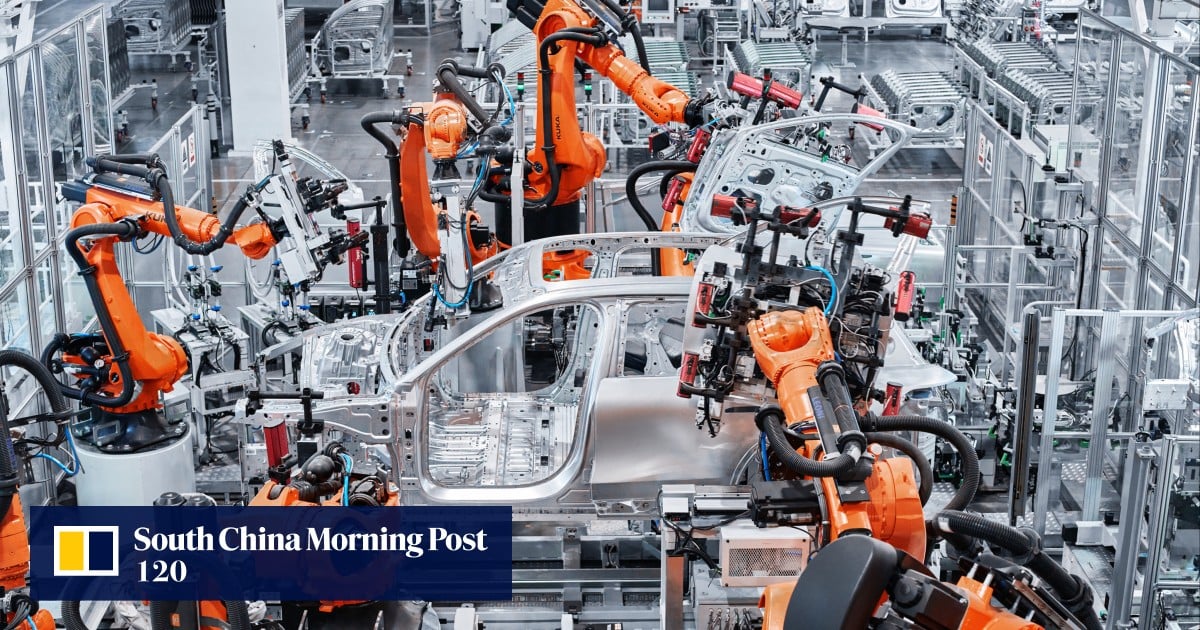As Nio swiftly integrates robots into its operations, the Chinese EV giant, ranked among the top three high-end electric vehicle manufacturers, is set to downsize its workforce by a third by 2027.
The company recently disclosed a workforce reduction of 10% earlier this month, aiming to bolster productivity and sustain its competitive edge.
Ji Huaqiang, the vice president overseeing manufacturing, logistics, and operations, revealed that Nio, headquartered in Shanghai, is actively embracing enhanced automation in its production processes. The strategic deployment of more artificial intelligence (AI) technologies across its facilities will lead to a projected 50% reduction in managerial roles.
“To reduce our dependence on skilled professionals and cut labor expenses, we are looking to leverage AI systems,” Ji stated. “By 2025, if AI can autonomously make 80% of our manufacturing decisions, we anticipate a 50% reduction in managerial positions.”
At the Nio EV plant in China, vehicles are assembled. Image: Nio
Looking ahead to the period between 2025 and 2027, Ji outlined plans to introduce commercial drones that could potentially decrease the need for human personnel on the production lines by 30%.
Public records from the corporate registry platform Qichacha indicate that Nio had approximately 7,000 employees by the end of 2022.
Envisioning a future of complete automation or a labor-free operational model at its manufacturing sites, Nio is banking on cutting-edge AI and mechanical innovations. However, Ji acknowledged the complexity of providing a definitive timeline for this transition.
Amidst mounting competition in mainland China, the world’s largest electric vehicle market, major EV manufacturers are under pressure to avert losses. With over 200 contenders in the market, concerns loom regarding escalating overcapacity.
Established in 2014, Nio has yet to achieve profitability. Competing against emerging players like Xiaomi and Baidu, alongside established rivals such as Xpeng and Li Auto, the company faces challenges in retaining affluent customers drawn to the allure of their innovative electric vehicles.
Your next stop could be a human at the China World Robot Expo 2023.
During the initial ten weeks of 2023, Nio recorded a substantial year-over-year sales growth of 36.3%, delivering 126,067 vehicles. Qin Lihong, the chairman, emphasized at the Guangzhou Auto Show on November 17 that a 40% year-over-year sales increase merely scratches the surface of the company’s design and manufacturing capabilities.
Nio operates two factories in Hefei, the capital of Anhui province in southeast China. The primary facility boasts an annual production capacity of 150,000 units on a single shift, while the secondary facility can manufacture up to 300,000 vehicles per year, even on a single shift. Typically, a workforce of 1,000 employees is required for a second shift.
According to Chen Jinzhu, CEO of Shanghai Mingliang Auto Service, “Nio currently possesses substantial manufacturing capacity and advanced production techniques necessary to support significant growth.” To drive revenue growth, the company must develop and design vehicles that resonate with a broader Chinese consumer base.
A Japanese startup has developed a Gundam-like machine costing US$2.7 million.
In a bid to fully automate a manufacturing process, 756 robots are deployed near the Hefei Xinqiao airport at the upcoming facility.
By leveraging state-of-the-art machinery, streamlined processes, and efficient supply chain management, Nio aims to position its stock as a global frontrunner in smart manufacturing.
Meanwhile, Nio’s competitor Xpeng, based in Guangzhou, unveiled plans in April to refine its designs and enhance performance in the coming year. This initiative aims to slash costs by 25% and bolster its competitive stance.
Brian Gu, the automaker’s president, highlighted that the efficiency enhancement and cost reduction strategy would pave the way for Xpeng to achieve positive cash flow by 2025.






